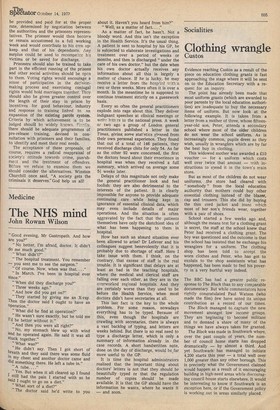Medicine
The NHS mind
John Rowan Wilson
"Good evening, Mr Gastropath. And how are you?"
"No better, I'm afraid, doctor. It didn't do me much good."
"What didn't?"
"The hospital treatment. You remember — you sent me to see the surgeon." "Of course. Now, when was that...." "In March. I've been in hospital ever since."
"When did they discharge you?" "Three weeks ago."
"And how did you get on?"
"They started by giving me an X-ray. Then the doctor said I ought to have an operation."
"What did he find at operation?" "He wasn't sure exactly, but he told me I'd be better without it."
"And then you were all right?" "No, my stomach blew up with wind and he operated again. He said it was all stuck together."
"What was?"
"He didn't say. Then I got short of breath and they said there was some fluid in my chest and another doctor came and did something there. He left a tube in." "A tube...."
"Yes. But when it all cleared up I found I still had the pain I started with so he said I ought to go on a diet." "What sort of a diet?"
"The doctor said he'd write to you about it. Haven't you heard from him?" "Well, as a matter of fact...."
As a matter of fact, he hasn't. Not a bloody word. And this isn't the exception in the Health Service. It's the usual thing.
A patient is sent to hospital by his GP, he is subjected to elaborate investigations and treatment over a period of weeks or months, and then is discharged "under the care of his own doctor," but the date when his own doctor actually receives any information about all this is largely a matter of chance. If he is lucky, he may receive a letter from the hcsp'tal w!th'n two or three weeks. More often it is over a month. In the meantime he is supposed to continue treatment strictly on a guesswork basis.
Every so often the general practitioners explode into rage about this. They deliver indignant speeches at clinical meetings or write Isttcrs to the national press. A week or two ago a group of London general practitioners published a letter in the Times, giving some statIstics gleaned from their own personal experience. They found that out of a total of 146 patients, they received discharge chits for only 54. As far as the other 92 were concerned, the first the doctors heard about their experience in hospital was when they received a full summary, which arrived on average some 53 weeks later.
Delays of this magnitude not only make the general practitioner look and feel foolish: they are also detrimental to the interests of the patient. It is clearly impossible for anyone to provide adequate continuing care while being kept in ignorance of essential clinical data, which may even include details of major operations. And the situation is often aggravated by the fact that the patients themselves have only the sketchiest idea of what has been happening to them in hospital.
How has such an absurd situation ever been allowed to arise? Dr Lefever and his colleagues suggest benevolently that it is probably due to shortage of staff. Here I take issue with them. I think, on the contrary, that excess of staff is the real trouble. It is significant that delays are at least as bad in the teaching hospitals, where the medical and clerical staff are falling over each other, as they are in the overworked regional hospitals. And they are certainly worse than they used to be before the Health Service, when most doctors didn't have secretaries at all.
This last fact is the key to the whole problem. For some reason, nowadays everything has to be typed. Because of this, even though the hospitals are crawling with secretaries, there is always a vast backlog of typing, and letters are weeks behind. But there is no real need to type a discharge letter, which is only a summary of information already in the case records. A short handwritten note, done on the day of discharge, would be far more useful to the GP.
It is time the hospital administrators realised that the important thing about doctors' letters is not that they should be beautifully typed or that the regulation number of copies should be made available. It is that the GP should have the information he wants, where he wants it — and soon.














































 Previous page
Previous page